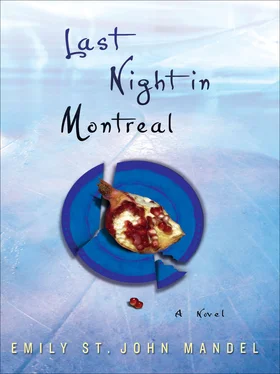Or perhaps it’s just this: memory is too unreliable to entrust a story to the hero alone. Someone else has to have observed the chain of events to lend credibility; if no one else remembers your story, how are you to prove that it was real? The witness, the man in the car in the parking lot told himself miserably, is not unimportant. (The couple was walking away from him now, toward Clara’s house.) He had been traveling alone for thousands of miles, and the only thing he was at all certain of at that moment was that he didn’t want to catch them anymore. He only wanted to watch their flight. Christopher raised his head from the steering wheel, rubbed his face with his hands, and decided that he needed to talk to Clara.
Two thousand miles to the north in another country, Michaela was sitting alone in her room. She was smoking fitfully, looking out the window. She had just turned sixteen, and she’d stopped going to school to celebrate. While she waited for her father to come back to her (she hadn’t seen him in a year), she began taking walks to the old city alleyways on weekends with a measuring tape. She had wished her whole life for a chance to walk on a high wire without a safety net. She had ideas involving alleyways and lengths of rope.
Clara in the mornings: she came down the stairs in a bathrobe, yawning, the stairs creaking under her feet. In the kitchen she stood for a moment by the open back door. She lived on the edge of town, and all the backyards on her side of the street opened out into the desert, a landscape of cacti and dry grass and scrubby blue-grey sagebrush that kept going until it met the hazy outlines of the mountains far away. The collapsed wreckage of an ancient picket fence marked a rectangle behind the house, but the lawn had been overtaken two decades before by the desert.
She came away from the door to begin making coffee. Lilia watched her from the kitchen table; she liked to sit there in the mornings, partly to read in the warm kitchen light and mostly to drink coffee with Clara. Clara poured coffee beans into an ancient cast-iron grinder mounted on the wall, measuring by eye, and then turned the iron handle until the smell of ground coffee filled the room. On the rare mornings when Lilia slept later than Clara did, this was the sound that woke her up. Clara was moving efficiently in and out of cupboards, removing mugs and the coffeepot, she was boiling water on the stove. She used cloth filters in a battered plastic funnel the color of sand. She poured boiling water until the clear glass coffeepot was almost full and then poured the coffee into the biggest mug in the house. She stood at the counter, sipping it black, and then she poured a second cup for Lilia, this one with milk in it. It was only after she’d brought the mugs to the table and sat in the chair closest to the back door, only after she’d taken another look out at the beautifully degenerate back lawn and the sky overhead, only then was she prepared to wish Lilia good morning, to have her first conversation of the day. She would smile companionably at Lilia before that moment, but her solitude before her first cup of coffee was almost impenetrable.
Lilia wrote in her notebook: This is life in a house. Clara had never traveled, and was perfectly serene. She’d lived alone for years in her small desert town and enjoyed her independence, although now her face lit up when Lilia’s father entered the room.
When Lilia’s father was with Clara he no longer looked like he was being chased, and Lilia was old enough to recognize this as happiness, but she was already moving away again. She was almost sixteen, and fraught with restlessness. She had had the same name for months now: Alessandra. The name was beautiful, but it wasn’t hers. She loved her father, she adored Clara, she was desperate to leave. She walked for hours along the streets of this dusty outpost, she wandered out into the desert behind the house, she read endlessly and translated literature in and out of four languages, she lay awake at night and felt enclosed in the silent house. She had been thinking lately about traveling away on her own. But at that moment the kitchen was cool and pleasant and she was happy to be there, and Clara stood with her back to the kitchen table looking out the window above the kitchen sink, sipping her coffee for a moment before she brought Lilia a cup. She set the coffee down on the table in front of her, kissed Lilia unexpectedly on the forehead, smiled as she moved around the table to her favorite chair.
“Happy birthday,” she said. “I’ll bring home a cake tonight.”
In the evening Lilia father and Clara sang “Happy Birthday,” her father’s arm over Clara’s shoulders, and Clara pulled a cake triumphantly from a square white box. The cake was white, with Sweet 16 across the top in pink icing. Later the three of them climbed out Lilia’s bedroom window to look at stars from the rooftop.
“It’s hard to imagine a place much quieter than this,” her father said. There was a dog barking somewhere far away, sporadically, but it only deepened the surrounding silence. Lilia held her hand up white against the stars and had the feeling of floating in space.
“It’s why I stay here,” Clara said.
“Are you ever going to leave?” Lilia asked.
Clara was quiet for a moment. “No. I mean, who can predict the future, but I don’t think so. I left a couple of times before, and I didn’t like it. Everywhere else was so. . loud,” she said. “It was too loud out there, in every way. The people weren’t nice. No one knew my name. I didn’t like it. I don’t like traveling.”
They had been in Stillspell for five months and the next day they were leaving. Just for four days, one last little birthday road trip for old times’ sake, and then they were coming back to Stillspell forever. Forever is the most dizzying word in the English language. The idea of staying in one place forever was like standing at the border of a foreign country, peering over the fence and trying to imagine what life might be like on the other side, and life on the other side was frankly unimaginable. They left in the morning; her father’s car pulled out of Clara’s driveway with the suitcases in the back, Clara waving from the porch; Lilia waved out the window until she was certain Clara couldn’t see her anymore, the car turning behind a row of decrepit storefronts at the end of the street, and then she settled back in the passenger seat with a guilty sense of rhythm restored.
“Where should we go, my lily?”
“The desert for a day or two. Then the mountains.”
“Brilliant plan.” He nodded toward the map folded on the dashboard. “What’s our course?”
Lilia took the map in her hands, marked with red lines drawn over the past nine years in motel rooms all around the continent, faded from nine summers of sun through the windshield. “Hard to say,” she said.
“Aren’t you supposed to be the navigator?”
“I know, I know, but look how faded this map is. .”
He glanced at it and laughed. “We should hang this one in the house,” he said, “and buy a new one for the road.”
Clara was turning to go back into the house when she saw another car approaching; this one was blue, and had foreign license plates. It pulled into her driveway as Lilia’s father’s car was turning out of sight. Clara stood by the door, obscurely afraid. A neighbor was trimming and trimming and trimming the adjoining hedge.
The man who emerged from the car was tall and stoop-shouldered, and he held a hat in front of his rumpled suit. He smiled as he approached her, but she didn’t smile back.
“Clara Williams?”
She nodded and glanced at the neighbor, who met her eyes above the hedge and then looked away quickly.
Читать дальше












